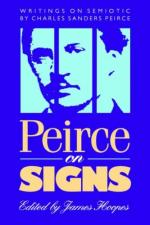|
This section contains 12,054 words (approx. 41 pages at 300 words per page) |

|
SOURCE: "Peirce's Transformation of Kant," in The Review of Metaphysics, Vol. XLVIII, No. 189, September, 1994, pp. 91-120.
In the following excerpt, Christensen discusses the critical relevancy of Peirce's philosophical contributions to pragmatism.
Although C. S. Peirce is generally regarded as the founder of American pragmatism, the fragmentary and incomplete character of many of his texts makes it hard to glimpse any systematic or coherent philosophy of pragmatism in them. One might respond to this state of affairs by interpreting Peirce in the light of the views of other pragmatists, in particular, of William James. While this interpretive strategy certainly gives one a handle on at least aspects of Peirce's philosophy, it has one decided disadvantage: it leads one to portray Peirce as simply the first in a line of thought which extends more or less continuously through James, Mead, and Dewey to Quine and even Richard Rorty. It is...
|
This section contains 12,054 words (approx. 41 pages at 300 words per page) |

|


